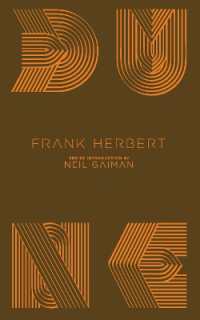- ホーム
- > 洋書
- > 英文書
- > Philosophy
Full Description
An original philosophical exploration of the limits of Hegel's thought.
In the preface to the second edition of the Science of Logic, Hegel speaks of an instinctive and unconscious logic whose forms and determinations "always remain imperceptible and incapable of becoming objective even as they emerge in language." In spite of Hegel's ambitions to provide a philosophical system that might transcend messy human nature, Félix Duque argues that human nature remains stubbornly present in precisely this way. In this book, he responds to the "remnants" of Hegel's work not to explicate his philosophy, but instead to explore the limits of his thought. He begins with the tension between singularity and universality, both as a metaphysical issue in terms of substance and subject and as a theological issue in terms of ideas about the human and divine nature of Jesus. Duque argues that the questions these issues bring out require a search for some antecedent authority, for which he turns to Hegel's theory of "second nature" and the idea of nature as reflected in the nation-state. He considers Hegel's evaluation of the French Revolution in the context of political and civil life, and, in a religious context, how Hegel saw considerations of authority and guilt sublimated and purified in the development of Christianity.
Contents
Preface
Acknowledgments
Part I. Substrate and Subject (Hegel in the Aftermath of Aristotle) 1. Aristotle: A Certain Underlying Nature and the Individual "Thing"
2. Not Substance, But Just as Much Subject
3. The Reflexive Movement of Thinking
4. The Unveiling of Substance as the Genesis of the Concept
5. Begging the Question of Beginning
Part II. Hegel on the Death of Christ
(Ich bin der Kampf selbst) 1. The Infinite Value of Subjectivity
2. The Death of Christ and the Commencement of History
3. The Strange Heart of Reason
4. "I Am the Unity of Fire and Water"
5. Natural Death and the Death of Death
Part III. Death Is a Gulp of Water
(La Terreur in World History) 1. Hegel and the Revolution—After Marxism
2. Living and Thinking One's Own Time
3. A Literal Reading of Hegel
4. Hegel's Two "Terrors"
5. Metal and Water: Beheading and Drowning
6. Fanaticism as a Chemical Precipitate
7. An Inverted Allegory of the Cave
8. From Absolute Negativity to the Element of Freedom
Part IV. Person, Freedom, and Community 1. The Entire Remnant of the Idea
2. Person as a Relational Nature
3. Abstract Right and Legal Recognition
4. Ethical Life and Bourgeois Virtues
5. A Strange Sort of Redemption
Part V. The Errancy of Reason (The Perishing of the Community) 1. The Devil, the Good Lord, and Human Blood
2. Man as the Possibility of God: Passio Christi
3. Cultus and Eucharist as Manducatio Spiritualis
4. The Spirit as the Wound of Time
5. The Fullness of Time as the Exhaustion of Time
Notes
Index








